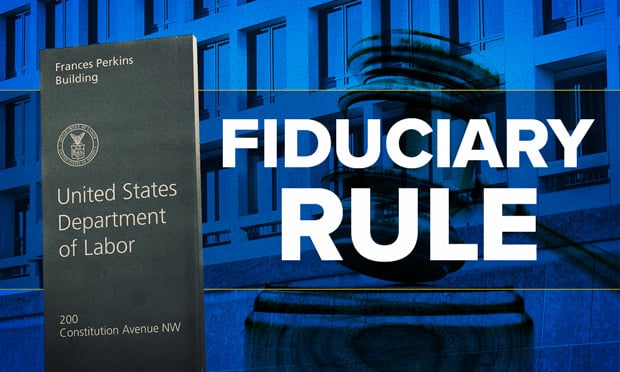What’s the first logical step that the Securities and Exchange Commission should takein crafting a fiduciary rule? Regulate advisor and brokertitles, advises the CFA Institute.
|The Commission “can effectively begin to regain control of this[uniform fiduciary rule] issue by regulating the titles that thosewho provide personalized investment advice can use,” Paul Smith,president and CEO of the CFA Institute, which sponsors and oversees theChartered Financial Analyst program and designation, told theagency in a June 13 comment letter.
|Related: As more retirement investors drop theF-bomb, this firm reaps the benefits
|Meanwhile, brokers in Nevada will now have to act as fiduciaries as of July 1 according to anewly revised law. Nevada Senate bill 383 revises thedefinition of financial planner "to remove the exclusions for abroker-dealer, a sales representative and an investment adviser,thereby making such persons subject to the provisions of existinglaw governing financial planners."
|CFA and other commenters are responding to SEC Chairman Jay Clayton’s June 1 request forcomments on ways to help the agency craft possible changes to theDepartment of Labor’s fiduciary rule, as well as inform “possiblefuture actions” by the agency on a fiduciary duty rulemaking of itsown.
|CFA Institute is “acutely aware of the difficulty the Commissionfaces in attempting to draft a uniform standard for everyoneproviding such [fiduciary] advice, as it would likely involvenumerous exemptions and carve-outs for different types of clients,transactions and situations,” Smith wrote.
|Like the Commission’s Investor Advisory Committee, CFA instituterecommends that the SEC require that "anyone wishing to refer totheir title and/or activities as advisory in nature (e.g. 'adviser'or 'advisor') adhere to the Investment Advisers Act and thefiduciary duty implied by common law interpretation of the Act,”Smith said.
||Such control of terminology “would not be new to the AdvisersAct, which already expressly limits use of the term ‘investmentcounsel’ to those who must adhere to the Advisers Act’srequirements,” he wrote.
|However, at the same time, CFA Institute believes“commission-based sales activities serve important client needs andgive investors options for how they wish to conduct theirinvestment activities.”
|Whether commissioned brokers provide investment ideas or executetrades, CFA Institute supports brokers being allowed “to pursuetheir business activities, so long as they are clear about theirroles vis-à-vis their clients.”
|Specifically, CFA said that the SEC should require that theyrefer to their roles with the title, “salespersons.”
|Said Smith: “For too long, these sales staff have blurred theline between what they do – selling investment ideas to generatecommission-based transactions – and what investment advisers do –advising clients on investment strategies and tactics to achievetheir financial goals.”
|Once the issue of titles is addressed, “the SEC will have aclearer idea of what kind of rules are needed to address otheraspects of the standards-of-care issue,” he added.
|David Madsen, a certified financial planner with Merrill Lynch,stated in his comment letter that the SEC’s “regulatory staff isthe agency equipped to implement and monitor a fiduciary standardrather than the cobbled together version from DOL (without adequateenforcement staff…so the world of ambulance-chaser attorneysbecomes the enforcement mechanism for DOL by default aswritten).”
|As to protecting the “little guy,” under Labor’s rule they arebeing labeled “as not profitable enough vs. the liability risk. Sothey are being told to ‘fire up your personal computer and get youradvice from a robo-advisor,’” Madsen wrote. “Human financial adviceis now a luxury that Washington is mandating only for the‘rich.’”
|Geoffrey E. Wilwerding, senior vice president of WealthManagement and senior portfolio manager with UBS Financial ServicesInc. in Seattle, told the SEC in his comment letter that “if youpass a standard like what is proposed [by DOL] it completelyhammers the little investor. Trust me, you will end up being hatedmore by small retail investors when all they are trying to do isinvest their funds and grow their assets.”
|Added Wilweding: “There are soooooooo many rules and regulationsin place as it is right now that any idiot broker who tries tochurn a small account gets stopped in his or her tracks almostimmediately at the firm level; so why blanket a rule that hits theyinvestor so hard? They are already protected. I don’t have aproblem with the fiduciary piece of it. The pricing piece will notmake sense.”
Complete your profile to continue reading and get FREE access to BenefitsPRO, part of your ALM digital membership.
Your access to unlimited BenefitsPRO content isn’t changing.
Once you are an ALM digital member, you’ll receive:
- Critical BenefitsPRO information including cutting edge post-reform success strategies, access to educational webcasts and videos, resources from industry leaders, and informative Newsletters.
- Exclusive discounts on ALM, BenefitsPRO magazine and BenefitsPRO.com events
- Access to other award-winning ALM websites including ThinkAdvisor.com and Law.com
Already have an account? Sign In
© 2024 ALM Global, LLC, All Rights Reserved. Request academic re-use from www.copyright.com. All other uses, submit a request to [email protected]. For more information visit Asset & Logo Licensing.








